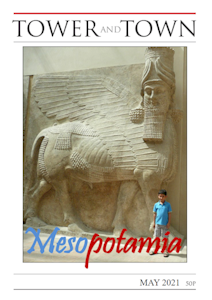

Tower and Town, May 2021 (view the full edition) (view the full edition)Christianity In IraqChristianity was established in Mesopotamia during the first Christian century and emerged as a well-organized church by the end of thChristianity was established in Mesopotamia during the first Christian century and emerged as a well-organized church by the end of the second century. It flourished despite resistance and persecution from the occupying Persians and became independent of other churches at the beginning of the fifth century (AD 424). This church was called 'The Church of the East' or 'The Persian Church'. The bishop of the capital of the Persian Empire, Celeuci Ctesiphone, became the Patriarch, the leader of this church. The remains of its famous cathedral 'Kokhe' can be found south west of Baghdad. The missionaries took their faith east to Iran, Central Asia, China, India, and south to the Arabian Peninsula, establishing prominent Christian centres of learning. In the fifth century another denomination was established 'The Syrian Orthodox Church', with centres in Tikrit, Der Mar Mattai and Qaraqosh. When Mesopotamia came under Muslim rule in AD 637, Christians were allowed to practise their faith, but treated as second class citizens. During the first three-centuries they contributed in various fields of learning, especially in medicine, education and translation. The latter was of vital importance, as the availability of Greek literature in Arabic was essential for the emergence of the Abbasid civilization. Christians were the only people who could do it because they were steeped in Greek learning, and knew Arabic well. They had already translated Greek works into their sacred language Syriac, which is similar to Arabic. However, Abbasid tolerance ceased by the tenth century and Christians suffered discrimination and persecution which forced many to head for the mountains in the north. Abbasid rule was ended by the Mongol Hulego in 1258, who favoured the Christians. But that lasted only a short period after which the Mongol Khan Kazan converted to Islam and persecuted the Christians. Mesopotamia was occupied by the Muslim Ottomans in 1534. They allowed the Christians to practise their faith but treated them as second class citizens. During World War I they inflicted atrocious massacre on the Armenians and Syriac Christians that some claim amounted to genocide. The Syriac Christians, who lived in south Turkey bordering Iraq and Syria, lost their homes and about half a million individuals. Those who survived took refuge in Iraq and Syria. After World War I the modern state of Iraq was established under the leadership of King Faysal I. Most Christians were concentrated in the city of Mosul and its environs and constituted about 30% of the population in these areas. Christians and other minorities were treated as equal citizens. Christianity flourished despite changes of regime after the overthrow of the monarchy, the Kurdish uprising, the Iraqi Iranian war and the cruelty of the regime of Saddam Hussein. The situation changed dramatically after the occupation of Iraq by US and British forces in 2003. Islamic fundamentalists started to attack Christians and other minorities with abductions, extortions and killings. Twenty of the clergy were abducted and six were killed. Over fifty churches were burned or damaged. In one mainly Christian district of Baghdad, Christians were given the ultimatum: 'convert to Islam or leave your home, otherwise you will be killed'. As a result of all these atrocities, Christians started to leave either to nearby countries with the intention of emigrating to western countries or to safer areas of Iraq, mainly Kurdistan. All this happened before the occupation of Mosul by the Islamic State in 2014. Abu Bakir al-Baghdadi occupied the city of Mosul on 9th of June 2014 and gave the ultimatum that Christians must leave Mosul within 24 hours. Soon after, the villages of the Nineveh Plain were threatened, forcing people to leave their homes. Thousands left in haste to Kurdistan, becoming refugees in their own country. Although the Islamic state was defeated in July 2017, it took time to rebuild some of the destroyed homes and churches in Mosul and the Nineveh Plain and more Christians left the country with the intent of emigrating. It is estimated that since 2003 about a million Christian have emigrated, 70% of the original population. Those who are still there do not feel very safe since the political situation is still problematic, with corruption and the increasing influence of neighbouring Iran. The recent visit of Pope Frances to Iraq gave a great impetus to the remaining Christians and everybody hopes that his message of peace and reconciliation in the Middle East will bear long term fruit. Suha Rassam was born in Mosul, Iraq, to a medical family. She was an Assistant Professor of Medicine in the University of Baghdad and came to England in 1990 to do further research. She then worked at hospitals in London and studied Eastern Christianity at London University. Suha Rassam is the author of Christianity in Iraq (3rd edition , Gracewing Publishers in Leominster, Hertfordshire) Suha Rassam |